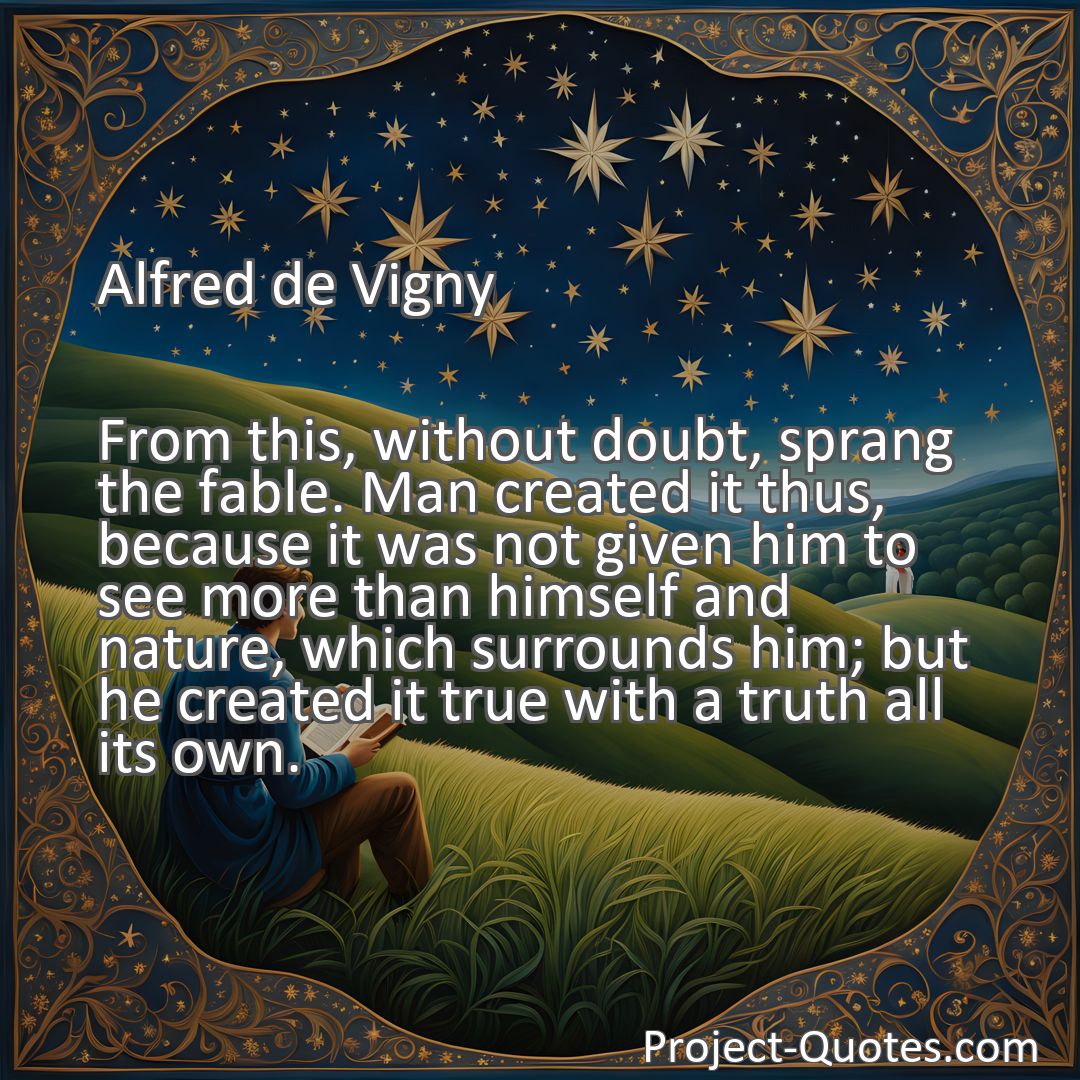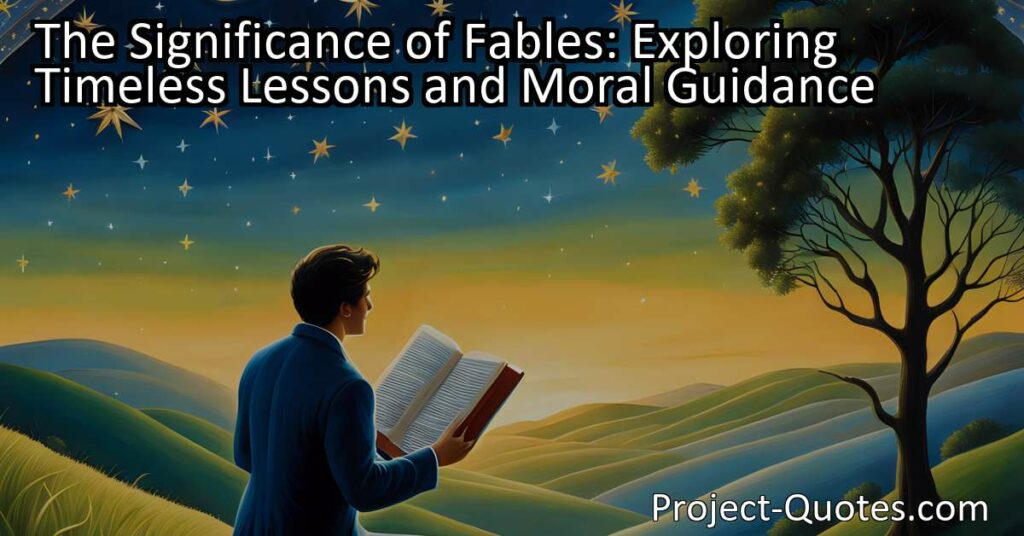From this, without doubt, sprang the fable. Man created it thus, because it was not given him to see more than himself and nature, which surrounds him; but he created it true with a truth all its own.
Alfred de Vigny
The significance of fables lies in their ability to teach timeless lessons and provide moral guidance to readers of all ages and cultures. These captivating tales, created by humans to overcome their limitations, offer a unique truth that goes beyond reality. Fables entertain, educate, and foster empathy, enriching our literacy skills and critical thinking abilities while standing the test of time. Let us embrace the world of fables and uncover the profound truths hidden within these timeless tales.
Table of Contents
- 1 From this, without doubt, sprang the fable. Man created it thus, because it was not given him to see more than himself and nature, which surrounds him; but he created it true with a truth all its own.
- 2 Alfred de Vigny
- 3 Meaning of Quote – From this, without doubt, sprang the fable. Man created it thus, because it was not given him to see more than himself and nature, which surrounds him; but he created it true with a truth all its own.
- 4 Freely Shareable Quote Image
- 5 Related
Meaning of Quote – From this, without doubt, sprang the fable. Man created it thus, because it was not given him to see more than himself and nature, which surrounds him; but he created it true with a truth all its own.
The world of fables and stories is a rich tapestry woven by human imagination. In the quote, “From this, without doubt, sprang the fable,” we are reminded of the origins of these captivating tales that have been passed down through generations. Fables have served as a charming medium through which we explore the truths and intricacies of our own existence. They have allowed us to delve into realms beyond our comprehension, providing us with valuable life lessons and moral guidance.
As the quote suggests, man created fables because he was limited to seeing no more than himself and the natural world that surrounds him. Our innate curiosity and desire to understand the mysteries of life led us to create these stories that go beyond what meets the eye. By personifying animals, objects, and natural forces, we were able to grasp complex concepts in a more accessible manner.
Furthermore, the quote emphasizes that fables were created with a unique truth, completely distinct from the reality we perceive. The essence of a fable lies in its ability to convey profound wisdom through engaging characters and imaginative scenarios. This “truth all its own” enables the fable to resonate with readers of all ages and cultures, transcending the boundaries of time and geography.
The power of fables lies in their ability to entertain while imparting profound life lessons. Take, for example, the popular fable of “The Tortoise and the Hare.” In this beloved tale, the slow and steady tortoise triumphs over the swift yet overconfident hare. The moral of the story, “Slow and steady wins the race,” teaches us the importance of perseverance and hard work. Through the personification of these animals, we are able to grasp this lesson in a simple and memorable way.
Fables also hold a mirror to human nature, showcasing the strengths, weaknesses, and complexities of our own character. In Aesop’s fable, “The Boy Who Cried Wolf,” a young shepherd repeatedly raises a false alarm about a wolf, causing the villagers to lose trust in him. When a real wolf finally appears, no one pays attention to the boy’s cries for help. This cautionary tale warns us about the consequences of dishonesty and the importance of credibility. By attributing human traits to the shepherd boy and the villagers, the fable holds a mirror to our own tendencies of lying and the detrimental effects it can have on our relationships.
The enduring popularity of fables is further testament to their timeless and universal appeal. These stories have transcended cultures and have been adapted and retold in various languages and art forms. Whether it’s Aesop’s fables in ancient Greece, Panchatantra tales from India, or the Brothers Grimm’s fairy tales from Germany, fables have captivated audiences around the world for centuries.
Not only do fables provide entertainment and moral guidance, but they also enhance our literacy skills and critical thinking abilities. When we engage with fables, we learn to analyze characters, identify themes, and draw conclusions. This encourages us to think beyond the surface level of a story and delve deeper into its underlying message. Such analytical skills are fundamental for comprehension and interpretation across countless literary works.
Additionally, fables contribute to our vocabulary enrichment. As we journey through these imaginative tales, we encounter new words and expressions that broaden our linguistic horizons. By expanding our vocabulary, fables enable us to express ourselves more eloquently and confidently.
Moreover, fables foster empathy and emotional intelligence. As we immerse ourselves in the lives of these anthropomorphized characters, we cultivate an understanding of their emotions, motivations, and struggles. This empathy extends beyond the realms of the fables and allows us to relate to real-life situations and experiences. It nurtures our ability to consider different perspectives and develop compassion towards others.
In recent years, fables have also found their place in education and character development programs. Teachers and parents recognize the potential of these stories to teach children essential values and life skills in an engaging and relatable manner. By incorporating fables into the curriculum, educators harness the power of storytelling to educate and inspire young minds.
In conclusion, the quote “From this, without doubt, sprang the fable” sheds light on the origins and significance of these enchanting tales. Fables have been created by humans to overcome the limitations of their understanding, offering a unique truth that transcends reality. Through personifying animals and objects, fables provide us with valuable life lessons, moral guidance, and a deeper understanding of ourselves. They entertain, educate, and foster empathy, enriching our literacy skills and critical thinking abilities. Whether passed down through oral traditions or found in books, fables have stood the test of time and continue to captivate audiences of all ages and cultures. So, let us embrace the world of fables and allow our imaginations to soar as we unravel the truths hidden within these timeless tales.
I hope this quote inspired image brings you hope and peace. Share it with someone who needs it today!


